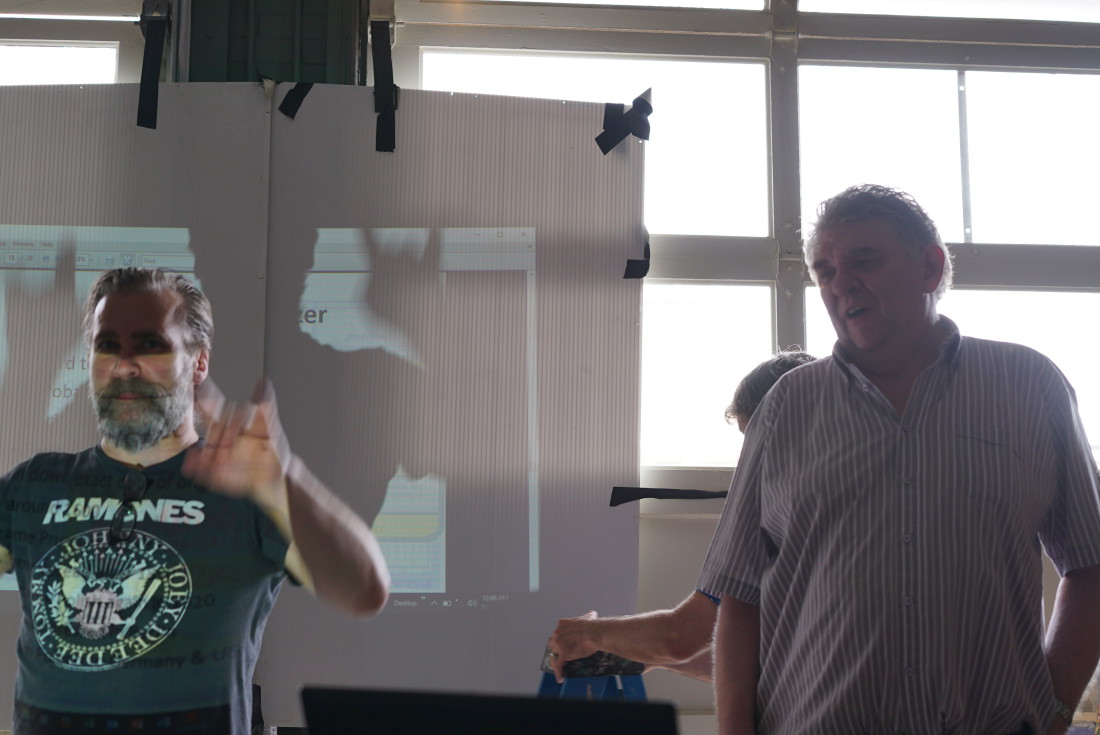Did you know that the traditional German stylistic designator weisbier has nothing to do with wheat? I didn’t, and I’ve over-indulged on weisbiers in Germany before. Lucky for me, esteemed beer historian Ronald Pattinson flew in from Amsterdam to disabuse me of my ignorance. Pattinson joined Zebulon Artisan Ales co-owners Mike Karnowski and Gabe Pickard (as well as their new puppy, Wallonia) on Sunday, May 28, at their Weaverville brewery to host one of AVL Beer Week’s most interesting and educational events: a lecture on lost and forgotten beer styles — and punk rock.
Zebulon brewed four beers according to recipes unearthed by Pattinson, naming them in honor of four iconic punk bands. The result was 400 hand-numbered four-pack box sets of bottle-conditioned, cork and caged 500-milliliter beers, entitled “RELICS! Lost and Forgotten Beer Styles.” The beers featured are an Arctic Ale (originally brewed for Arctic expeditions in the 1880s) for The Damned, a Grodziskie for The Clash, a Kotbusser for the Sex Pistols and a circa-1750 October Beer for The Ramones. Each box contains a booklet written by Pattinson explaining the beers themselves and recounting his personal take on the bands that inspired them. A small number of RELICS! box sets are receiving limited distribution to specialty retailers around Asheville.
Early-entry VIP attendees, including Brent Manning of Riverbend Malthouse, Andy Shepard of Wedge Brewing Co. and Philip Shepard of Oyster House Brewing Co., had access to a draft list composed entirely of historic styles from the British Isles. The offerings consisted of beers modeled after Fuller’s Brewery X Mild, Whitbread IPA, Fuller’s Porter, Whitbread SS Stout, Fuller’s Pale Ale, Whitbread XXX (“Old Burton”) and Maclay’s Scottish 60 Shilling. While modern iterations of some of these beers are currently available, the older recipes differ significantly from their present-day counterparts.
As the opening act for Pattinson’s lecture, Karnowski conducted a thorough analysis of notorious American malt liquor Olde English 800 in the context of 19th-century British beers. His assertion that “OE,” as it’s colloquially known, was an accurate representation of an English Mild from the 1800s was supported by a series of beers that he brewed according to period-specific recipes, including an 1880 Whitbread XX, a Younger’s 80 shilling from 1847 and an 1898 Younger’s XX. While some clear distinctions were apparent, most notably in the prevalence of hops, the similarities were indeed striking.
Trying OE for the first time in his life, Karnowski’s expert opinion was that it’s “not as awful as [he] feared.”
Pattinson then took the stage, discussing his background in beer writing and his early days as a music journalist for his school paper. He began the talk in earnest by explaining the process through which beer styles are lost or forgotten, including descriptions of obscure styles and explaining the rationale behind their creation as well as the possible reasons for their demise. World War I, for example, killed a lot of beer styles, according to Pattinson.
A true scholar of beer, Pattinson’s oratory style was informative and engaging. His 90-minute talk was packed with exhaustively researched historical details of beer and brewing through the centuries, in addition to amusing anecdotes of listening to punk rock in the seventies while attending Leeds University. Special attention was given to the four RELICS! beers, with Pattinson recounting stylistic indicators and historical overviews for each while the audience sampled the appropriate beer.
Pattinson managed to render what could have been a dry, academic discourse into something fun and accessible. He was just as likely to draw laughs for his discussion of butt (i.e. large barrel) beer or his vehement insistence that Grodziske is not a sour style as he was from his story of having seen the Sex Pistols cover a Monkees song or the embarrassing admission that he once walked out on a Clash show.
Pattinson was kind enough to stick around after the lecture to answer questions from the packed house, delving into topics ranging from his disdain for prog rock and post-punk to his “desert island” beer — Brouwerij St. Bernardus Abt. 12. He also remained on hand to sign copies of his many books, such as The Homebrewer’s Guide to Vintage Beer and a number of works covering the history of specific beer styles and the respective beer cultures of several Western European nations.
In his introduction of the event, Karnowski stated that his intent was to challenge the audience’s preconceptions and make them rethink their attachment to Beer Judge Certification Program style guidelines. To this end, it was a resounding success. None of the attendees went away thirsty, and all were likely to have left with an enhanced understanding of what beer styles actually are and how they come about.




Before you comment
The comments section is here to provide a platform for civil dialogue on the issues we face together as a local community. Xpress is committed to offering this platform for all voices, but when the tone of the discussion gets nasty or strays off topic, we believe many people choose not to participate. Xpress editors are determined to moderate comments to ensure a constructive interchange is maintained. All comments judged not to be in keeping with the spirit of civil discourse will be removed and repeat violators will be banned. See here for our terms of service. Thank you for being part of this effort to promote respectful discussion.